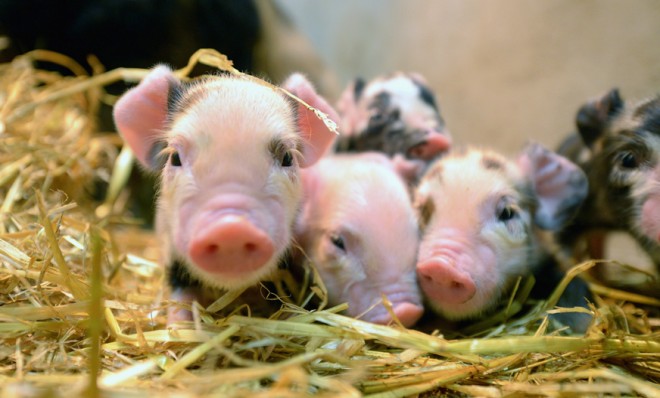12 onomatopoeias from around the world
Chik chik pok pok is the sound of a train in Korean. Ghrutu ghrutu is pig grunting in Georgian. And more!


A free daily email with the biggest news stories of the day – and the best features from TheWeek.com
You are now subscribed
Your newsletter sign-up was successful

Boom! Clang! Splat! English is full of onomatopoeia — words that sound like the noises things make. But the words don't reproduce those noises exactly. They are language-conditioned versions of those noises. They have to fit the patterns of English, and they have to be learned. Other languages have their own ways of representing sounds in the world. Here are 12 wonderfully evocative onomatopoeias from around the world.
1. KOREAN — CHIK CHIK POK POK (칙칙폭폭)
The sound of a train.
The Week
Escape your echo chamber. Get the facts behind the news, plus analysis from multiple perspectives.

Sign up for The Week's Free Newsletters
From our morning news briefing to a weekly Good News Newsletter, get the best of The Week delivered directly to your inbox.
From our morning news briefing to a weekly Good News Newsletter, get the best of The Week delivered directly to your inbox.
Where we would use "chugga chugga choo choo," Koreans use chik chik pok pok. It's the sound of train wheels bumping over the tracks, so it's actually closer to the "chugga chugga" part than the "choo choo" part.
2. GERMAN — MAMPF MAMPF
Munching.
This is like the English "nom nom." There's also a noun der Mampf, slang for a meal or a nosh, and a verb mampfen, "to nom on" or "chow down on."
A free daily email with the biggest news stories of the day – and the best features from TheWeek.com
3. RUSSIAN — GAV GAV (ГАВ-ГАВ)
A dog barking.
Not all dogs speak the same language! Russian dogs say gav gav, and if they are small dogs they say tyav tyav.
4. JAPANESE — PACHI PACHI (パチパチ)
The sound of a crackling fire.
Pachi pachi can be used for all sorts of small popping or clicking noises. It is also used for clapping, the sound of popping popcorn or bubblewrap, and the noise ice makes when it cracks as hot liquid is poured on it.
5. FRENCH — RON PSHI
Snoring
Where English focuses on the "zzzzz" of the long snoring exhale, French includes both the inhale and exhale in its sound image of the snore.
6. THAI — SUAAN SAEH HAEH HAA (สรวลเสเฮฮา)
Merry-making.
This means something like "Jolly! Delight! Yipee! Ha ha!" and refers to the sound of a crowd of people being happy and having a good time.
7. LATIN — TUX TAX
Hitting, smacking
In the play Persa, one of the earliest surviving works in Latin, a character remarks of his master, "tux tax erit meo, non curo!" ("He will whack! bam! beat me, but I don't care!")
8. GEORGIAN — GHRUTU GHRUTU (ღრუტუ ღრუტუ)
Pig grunting.
In Georgia, pigs sound tougher. They say, "ghrutu ghrutu."
9. LATVIAN — BLIUKŠ
Bubble popping.
Can also be used for short sharp sounds, like the popping of fireworks or the smack of a fly-swatter. Also has the metaphorical sense of "poof!" — things disappearing.
10. VIETNAMESE — HỚT HƠ HỚT HẢI
Gasping for breath.
This representation of heavy breathing has also taken on the meaning of being panic-stricken or in a hurry.
11. KINYARWANDA — SHÍSHÍSHÍSHÍ
Shivering with cold.
While we focus on lip shivering with our "brrr," in Kinyarwanda, the language of Rwanda, you show you're cold with a different shivery sound.
12. FINNISH – KÄKÄTTÄÄ
Evil laugh.
In addition to this word for a malevolent, mocking cackle, Finnish also has kikattaa (a giggle), hekottaa (a guffaw), and hihittää (a snicker).
A version of this story originally appeared in mental_floss magazine. You can get a free issue here.
More from Mental Floss...
Arika Okrent is editor-at-large at TheWeek.com and a frequent contributor to Mental Floss. She is the author of In the Land of Invented Languages, a history of the attempt to build a better language. She holds a doctorate in linguistics and a first-level certification in Klingon. Follow her on Twitter.
-
 Switzerland could vote to cap its population
Switzerland could vote to cap its populationUnder the Radar Swiss People’s Party proposes referendum on radical anti-immigration measure to limit residents to 10 million
-
 Political cartoons for February 15
Political cartoons for February 15Cartoons Sunday's political cartoons include political ventriloquism, Europe in the middle, and more
-
 The broken water companies failing England and Wales
The broken water companies failing England and WalesExplainer With rising bills, deteriorating river health and a lack of investment, regulators face an uphill battle to stabilise the industry
